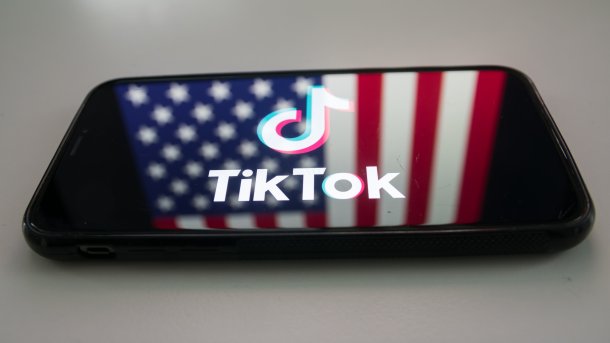TikTok fights against possible US ban: ‘We're not going anywhere!’
After TikTok is to be forced to sell the app in the USA, the TikTok boss announces the fight against the law. He expects a victory in court.

(Image: Camilo Concha/Shutterstock.com)
TikTok is not giving up. Just a few minutes after US President Joe Biden signed the law passed by the US Congress to force the short video app to be sold, TikTok's CEO announced a successful legal battle against it on social networks. "We're not going anywhere," said Shou Zi Chew via video. "The facts and the constitution are on our side and we expect to prevail again."
Yesterday, a large majority in the US Senate voted in favor of the forced sale of TikTok and shortly afterwards Biden signed the bill into law. This gives Chinese TikTok owner ByteDance 270 days to sell the app to (Western) investors; otherwise the popular app would be banned from the app stores and thus effectively banned. ByteDance had previously announced its intention to go to court.
In the US, ByteDance is seen across party lines as a Chinese company that must bend to the will of the Chinese Communist Party. There are therefore warnings that Chinese authorities could gain large-scale access to data from users in the USA – and also use the extremely popular application to exert political influence. TikTok has repeatedly denied this.
TikTok bans have so far failed in court
TikTok claims to have 170 million users in the USA. Back in 2020, then US President Donald Trump wanted to ban TikTok, but did not succeed. US courts had suspected that the plans to ban the app were a violation of constitutionally protected freedom of speech. Last year, a judge temporarily halted a TikTok ban in Montana on the grounds that it was unconstitutional.
TikTok emphasizes that it does not see itself as a subsidiary of a Chinese company. ByteDance is 60 percent owned by Western investors. The company is based in the Cayman Islands in the Caribbean. However, the US policy counters that the Chinese founders hold a 20 percent stake thanks to higher voting rights and that ByteDance's headquarters are in Beijing, where it is impossible to escape the influence of the authorities.
Deadline until January, Chinese security concerns
Biden's signature sets TikTok and ByteDance a deadline of January 19, 2025 – one day before the end of the current US president's term. However, he can postpone the deadline by three months if ByteDance makes visible progress, writes Reuters. "We don't want to see a ban," a White House spokeswoman explained a few days ago. "This is about the ownership of the People's Republic of China."
Read also
Kommentar: Lustige TikTok-Videos werden die Politik nicht retten
TikTok schaltet Reward-Programm nach Drohung der EU-Kommission vorerst ab
TikTok: Nutzerwerbung für Osama bin Laden geht viral, Sperre gefordert
Open source plans for US TikTok: Perplexity brings itself into the game
US business of TikTok: Negotiations are underway with four interested parties
In China itself, Western social networks such as Facebook, Instagram and Threads are banned – for national security reasons. Just last week, Apple was forced to remove WhatsApp and Threads from the App Store in China after remaining loopholes, such as VPN services, were closed. The US policy action against TikTok is complicated by the app's great popularity: Joe Biden announced his support for the legislative plans early on, but his team is now using the app for election advertising.
Controversial ban, questionable sale
However, the possible ban on TikTok is also politically controversial within the USA – across party lines. The American Civil Liberties Union (ACLU) stated that a TikTok ban would "set an alarming global precedent for excessive government control over social media platforms". Democratic Senator Ron Wyden warns that the bill "provides sweeping powers that could be abused by a future administration to infringe on Americans' First Amendment rights."
It is also questionable whether there is a potential buyer for TikTok that has the financial resources and whether China and US regulators would agree to a sale. China's government has already signaled that a forced sale of TikTok in the US would not be approved. It would be more likely that the app would be banned.
(fds)